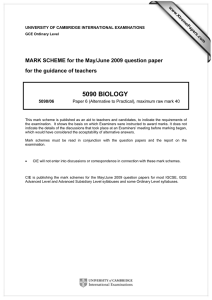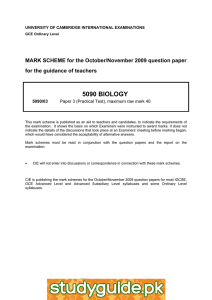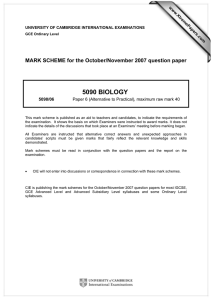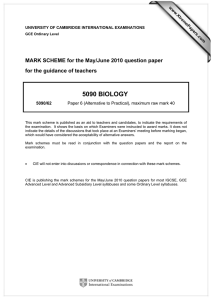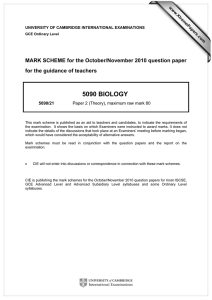GCE O Level Biology Mark Scheme 2010
advertisement
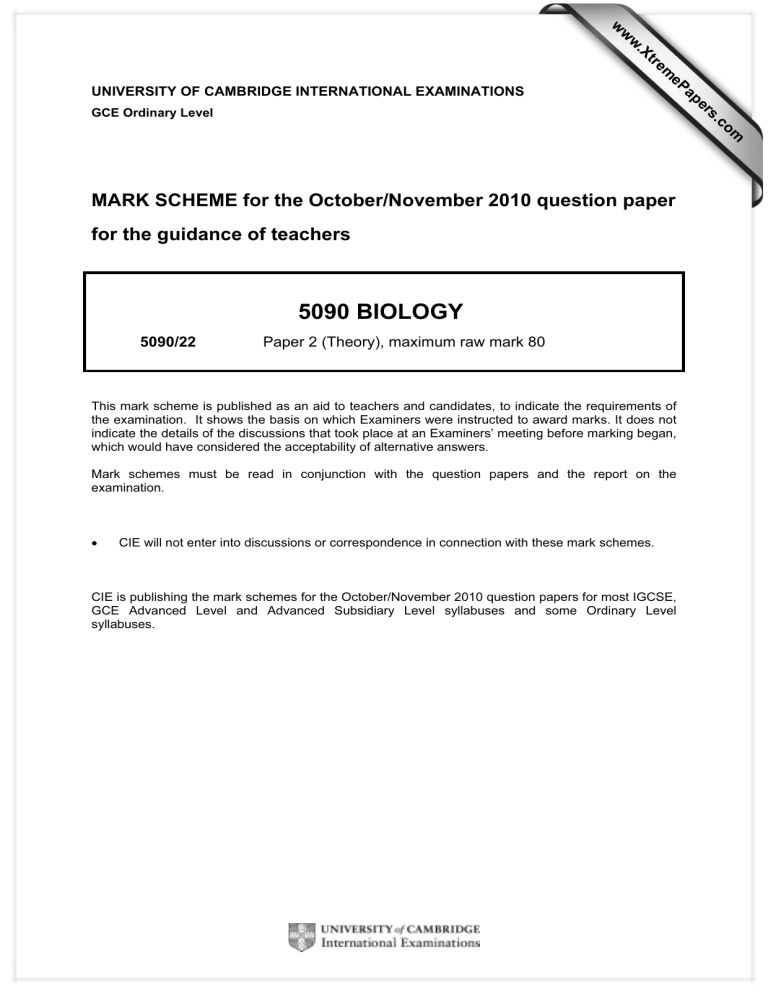
w w ap eP m e tr .X w UNIVERSITY OF CAMBRIDGE INTERNATIONAL EXAMINATIONS s er om .c GCE Ordinary Level MARK SCHEME for the October/November 2010 question paper for the guidance of teachers 5090 BIOLOGY 5090/22 Paper 2 (Theory), maximum raw mark 80 This mark scheme is published as an aid to teachers and candidates, to indicate the requirements of the examination. It shows the basis on which Examiners were instructed to award marks. It does not indicate the details of the discussions that took place at an Examiners’ meeting before marking began, which would have considered the acceptability of alternative answers. Mark schemes must be read in conjunction with the question papers and the report on the examination. • CIE will not enter into discussions or correspondence in connection with these mark schemes. CIE is publishing the mark schemes for the October/November 2010 question papers for most IGCSE, GCE Advanced Level and Advanced Subsidiary Level syllabuses and some Ordinary Level syllabuses. Page 2 Mark Scheme: Teachers’ version GCE O LEVEL – October/November 2010 Syllabus 5090 Paper 22 Section A 1 (a) A B vena cava (I anterior / superior); pulmonary vein; [2] (b) 2 sets of aortic valves shown; 2 sets of atrio-ventricular valves shown in correct places; unattached end(s) of aortic valve(s) pointing upwards; unattached end(s) of a-v valve(s) pointing downwards; [4] (c) arrow(s) correctly into, through and out of right side of heart; (i.e. look for evidence of all three sites) arrow(s) correctly into, through and out of left side of the heart; [2] (d) Any two (**mark the first, one per line unless a line is left blank) from: mixing of blood, ref. possible effect on pressures of blood (but if stated, must be lower), ref. possible effect on volume of blood (leaving heart or one chamber), reduced oxygen carriage round the body, heart has to work harder, feeling tired AW, shortness of breath, fluid build-up, ;; (In fact, blood passes from left to right atrium – but do NOT penalise if wrong.) [2] [Total: 10] 2 (a) (i) pollination / consume other pests / decompose to release ions AW; (ii) disease / consumption / damage; (b) mutation; variation; resistance (R immunity); survival / no longer has an effect / natural selection; (survivors) breed / pass on resistance; more / greater proportion of resistant individuals each year; immigration; less (R no) insecticide sprayed ; [2] [max 5] (c) [** – see Q2(d)] any three from: use fertiliser, use seed from resistant crops AW / artificial selection, grow genetically modified crops, use biological control or method, better harvesting methods, crop rotation, irrigation, use greenhouses / nets, pick off insects manually, fungicides etc., OVP (= Other Valid Point),;;; [3] [Total: 10] © UCLES 2010 Page 3 3 Mark Scheme: Teachers’ version GCE O LEVEL – October/November 2010 (a) (i) photosynthesis; Syllabus 5090 Paper 22 [1] (ii) *CO2; (CO2 or H2O) from atmosphere / air / environment / lake; (or described) respiration; (CO2) in solution; [max 3] *water (for photosynthesis stated or implied); (*R on equation alone with no explanation) (b) (i) protease or named protease; [1] [1] (ii) amino acids; to make proteins; for growth / repair / (proto)cytoplasm; (c) nitrates; [3] [1] [Total: 10] 4 (a) (i) C – testa / seed coat; D – plumule / shoot; [2] (ii) radicle (R root); [1] (b) water; from parent plant; oxygen ; from atmosphere / air / photosynthesis; diffusion / osmosis (one correct relevant ref.); food / named food + from seed / cotyledon; [max 4] (c) not identical to / not the same (as parent); (visible) remains of the flower; (indicates) sexual reproduction; and self- / cross-pollination; some genes or chromosomes from another flower / plant AW; [max 4] [Total: 11] © UCLES 2010 Page 4 5 Mark Scheme: Teachers’ version GCE O LEVEL – October/November 2010 Syllabus 5090 Paper 22 (a) line outside the body wall (roughly following body contours); (A a line drawn anywhere en route from the left to right ‘bottom corners’. R horizontal line) (b) One mark per line, mark the first. Candidates must select a particular route – breathing tubes OR blood vessels For breathing tubes: F – bronchus / bronchiole; G – bronchus; For blood vessels: F – arteriole or artery / venule or vein / blood vessel; G – artery / vein / blood vessel; H – ribs; (c) moves up; and out; increasing volume; decreasing pressure; ref. contraction; of (external) intercostals (the ref. must be relevant to the process); [1] [3] [max 5] [Total: 9] [Total for Section A = 50] © UCLES 2010 Page 5 Mark Scheme: Teachers’ version GCE O LEVEL – October/November 2010 Syllabus 5090 Paper 22 Section B In this section all marking points should be indicated using the green ticks. (Other annotations should be used to clarify your reasons for awarding or withholding a mark.) 6 (a) chemical (R named hormone); released / produced by a gland; into blood; target organ; effect / alter the activity of; destroyed by the liver; [max 4] (b) *deviation from set point (or described); (For insulin / ADH, set point must be ref. glucose / water in the blood) named hormone (for more than one hormone, mark the best account. R adrenaline / thyroxine); named gland that produces it; (R for any hormone that is not involved in homeostasis) name of target organ; effect (which must be homeostatic) correct for example; *homeostasis; *return to set point AW (A ‘keeps constant’, but R regulates / controls); (Need not refer to blood) (*Only these marks available if hormone is incorrect.) [max 6] [Total: 10] 7 (a) single cell; cell wall; DNA in cytoplasm / plasmids / DNA loops; no nucleus / nuclear membrane; size ref. (0.5–5.0µm) / microscopic / binary fission (A mitosis); parasitic + saprophytic or described; max 4 (b) substrate / food or named / fermenter or described; (A nutrient) sterilised*; aerobic / anaerobic in correct context*; stirring*; temperature control or reasonable temperature mentioned*; (20–40 °C) named end product (not available if a fungus is used – but A antibiotics or correct named antibiotic, if fungus not mentioned.); extraction / purification / treatment after fermenter; (A adding fruit / flavour for yoghurt) * reasons for any two of these requirements;; [A (reason for stirring is) to mix, but R to stir] If they choose genetic engineering these are additional marking points: select gene ; insert into bacterial DNA / plasmid; [max 6] [Total: 10] © UCLES 2010 Page 6 Mark Scheme: Teachers’ version GCE O LEVEL – October/November 2010 Syllabus 5090 8E diffusion; named substance; ref. concentration gradient; (substance) used in cell (to maintain gradient); Paper 22 (max 3) osmosis; water ; ref. conc. of molecules or solution / water potential gradient; ref. cell membrane; partially AW permeable; (max 4) active transport AW; against concentration gradient; energy; from respiration; named substance (A minerals / ions / salts); ref. phagocytosis / endo- / exocytosis; (max 4) [Total: max 10] (Note that component parts add up to eleven.) 8O (a) mother’s blood; (spongy) lining; of uterus (mark tied to lining); diffusion; placenta (structural or functional ref.); capillaries (either maternal or fetal); oxygen + respiration; glucose + respiration / energy source); amino acids + ref. proteins or growth or cell division; salts / ions / one named / vitamins / minerals; any ref. to a use of a salt or a vitamin; fetal blood; umbilical (cord) (structural or functional ref., A with ref. blood vessels, so long as correct); CO2 / carbon dioxide; urea; [max 8] [2] [Total: 10] [Total for Section B = 30] © UCLES 2010
